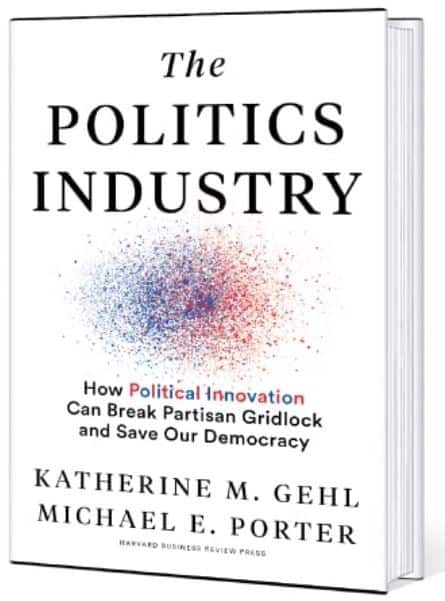By Jim Heffernan
I usually wait until I finish a book before I begin to write my review, but this one is different. I’ve read a lot of books about contempory politics and “The Politics Industry” is special. I’m very impressed how original and even-handed it is.
Michael Porter is an economist born in 1947 who is known in academic economic circles for his “Five Forces” theory that is a tool for analyzing competitive rivals. He came up with the principle in 1979 and it is widely respected in the world of economics. He calls himself a “Massachusetts Republican”
Katherine Gehl was born in 1966. She grew up in Michigan and was the daughter of the founder of Gehl Foods. She was a political activist in the Democratic party before she became CEO of Gehl Foods. She now calls herself a “politically homeless centrist independent”.
Michael and Katherine met in 2013 when she hired Michael as a consultant to help turn around losses at Gehl Foods. Their partnership was successful in helping Gehl Foods regain its footing and it also spawned the idea for this book. Michael had always spurned politics, but Katherine saw the obvious connection of the “Five Forces” method to the dumpster fire that passes for our political process.
The “Five Forces” theory posits that in a competitive enterprise the five forces that affect success/failure are 1. the rivals, 2. the threat of new entrants, 3. the threat of substitutes, 4. the bargaining power of suppliers, and 5. the bargaining power of buyers.
Applying this model to the giant industry of politics it becomes abundantly clear that everything is warped to ensure the hegemony of the rivals. Current laws erect nearly insurmountable walls against the threats of new entrants and substitutes. The bargaining power of suppliers is immense, but mainly serves to perpetuate the power of the rivals. The bargaining power of buyers is minimalized.
The book very capably defines the equivalent of each of the forces in our national politics. The resulting picture is rosy for the duopoly (Republicans and Democrats) at the center, but dismal for all but the suppliers.
Katherine and Michael offer up solutions tied to big changes in our primary election system and much-needed reforms to the rules legislators set for themselves.
The way it is done in America, politics is a truly giant industry. More and more, politics is an industry that operates for the benefit of the duopoly (Republicans and Democrats) at the center instead of its customers (us).
Here are excerpts I found particularly relevant.
Page 32
“The American political system is perfectly designed to serve the private interests of this political-industrial complex: to grow its power and revenues and to protect itself from threats. It’s not designed so well to serve citizens – those who should, by rights, be the most important customers of the industry.”
Page 173
“Investing in political innovation begins by evangelizing its benefits. It grows to joining innovation campaigns in your state. If no effort is underway, you can take the critical step and founding one yourself.”
Page 178
“It is time for a new role for American business, one that moves away from single bottom-line thinking and toward a more holistic balance sheet that includes the health of our great nation, writ large.”
As always, I welcome discussion at codger817@gmail.com
 319 pages (131 pages notes, index, etc.) Published June 23, 2020
319 pages (131 pages notes, index, etc.) Published June 23, 2020
Goodreads 4.31 out of 5 average 416 ratings

